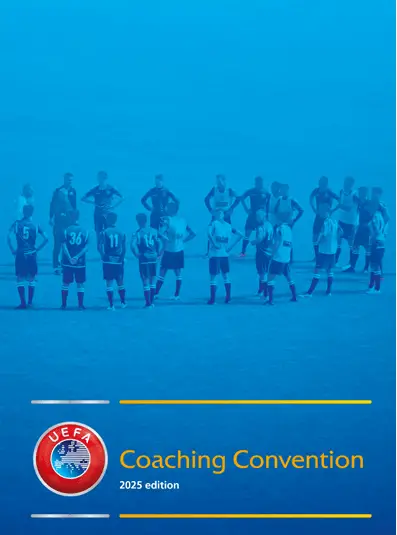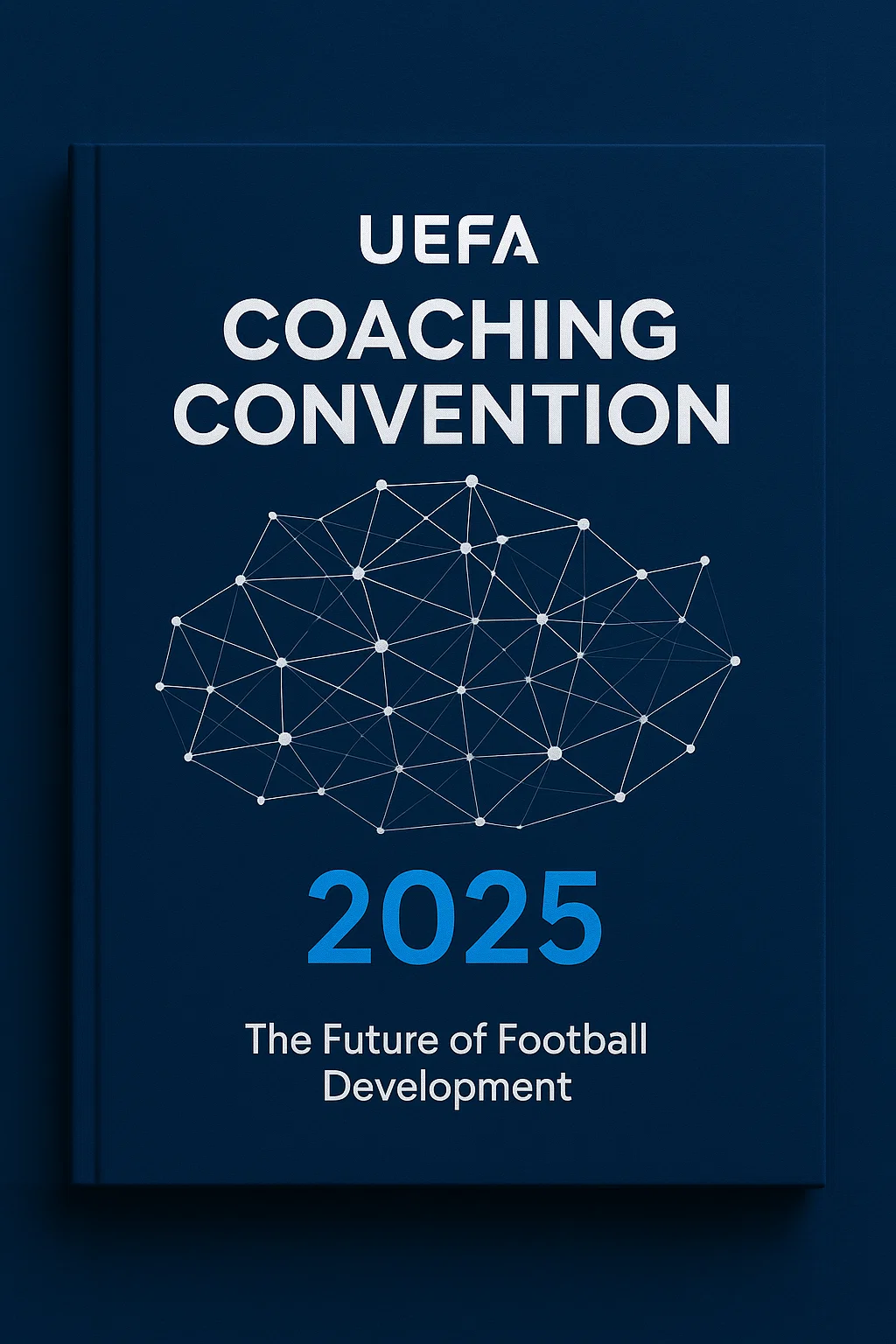UEFA Coaching Convention 2025: The Future of Football Development

UEFA Coaching Convention 2025: The Future of Football Development
Introduction: A New Era in Football Education
The UEFA Coaching Convention 2025 represents a groundbreaking evolution in football education and coach development. As the beautiful game continues to evolve at an unprecedented pace, this comprehensive framework sets new global standards for coaching excellence. The convention emerges at a crucial juncture in football history, where technological advancements, sports science research, and changing tactical landscapes demand a more sophisticated approach to coach education.
According to recent data from UEFA’s Technical Development Department, countries that have fully implemented previous convention frameworks have seen a 47% increase in qualified coaches and a corresponding 32% improvement in youth player development metrics. The 2025 edition builds upon this success while introducing innovative approaches that address the modern game’s complexities.
The Historical Context: Evolution of Coaching Standards
From Foundation to Innovation
The UEFA Coaching Convention has undergone significant transformation since its inception. Initially established to create minimum standards across European football, the convention has evolved into a comprehensive ecosystem for coach development. The 2025 edition represents the most ambitious update yet, incorporating insights from leading football associations, sports scientists, and coaching innovators.
The convention’s historical journey mirrors football’s own evolution. What began as a basic qualification framework has transformed into a holistic development system that addresses technical, tactical, physical, and psychological aspects of the game. This progressive development is crucial for understanding the convention’s current impact and future direction.
Key Innovations in the 2025 Edition
Digital Integration and Technology Adoption
One of the most significant advancements in the 2025 Convention is its embrace of digital technology. The framework incorporates:
- Virtual reality training simulations
- AI-powered performance analysis tools
- Digital certification and verification systems
- Online continuous professional development platforms
These technological integrations complement traditional coaching methods while providing new tools for coach education. The convention recognizes that modern coaches must be proficient in both traditional coaching methodologies and emerging technologies.
Personalized Learning Pathways
The 2025 framework introduces customized development trajectories based on individual coaching strengths, weaknesses, and career aspirations. This approach moves beyond the one-size-fits-all model, recognizing that coaches have different learning styles and professional goals.
Coaching License Structure: A Comprehensive Overview
Foundation Level: Building Core Competencies
The convention maintains its structured license pathway while introducing significant enhancements at each level. The foundation levels focus on developing essential coaching competencies through practical, hands-on learning experiences.
The UEFA B License Coaching Manual PDF provides crucial resources for coaches beginning their journey, offering comprehensive guidance on fundamental coaching principles and practice design.
Advanced Certification: Mastering the Craft
For coaches pursuing advanced qualifications, the convention introduces more specialized and intensive learning experiences. The UEFA A Licence: The Complete Coach’s Guide PDF serves as an essential resource for coaches preparing for these challenging certifications.
Elite Level: Shaping Football’s Future
At the pinnacle of coach education, the UEFA Pro License Course PDF represents the gold standard in football leadership development. The 2025 enhancements focus on strategic management, high-performance culture, and innovation implementation.
Practical Implementation: From Theory to Practice
Session Planning Excellence
Effective session planning remains at the heart of quality coaching. The convention emphasizes the importance of structured, progressive training sessions that address specific learning objectives. Resources like the UEFA A Coaching Session Plans provide valuable templates and frameworks for coaches implementing the convention’s principles.
Furthermore, the UEFA B License Coaching Sessions PDF offers practical examples of how to translate theoretical concepts into engaging, effective training sessions.
Training Methodology Innovations
The 2025 convention introduces several groundbreaking approaches to training methodology:
- Integrated technical-tactical development
- Position-specific training modules
- Game-based learning approaches
- Cognitive development exercises
These methodologies are supported by resources such as the 60 Training Games PDF and Warm-Up Exercises with Ball PDF, which provide practical tools for implementing the convention’s training philosophy.
Global Impact and Integration
Harmonizing European Standards
A primary objective of the 2025 convention is to further harmonize coaching standards across UEFA’s member associations. This alignment ensures consistent quality while allowing for cultural and contextual adaptations.
The convention’s framework facilitates knowledge exchange between associations, creating a dynamic ecosystem of shared learning and continuous improvement.
International Recognition and Equivalency
The convention’s global reputation means that UEFA qualifications are recognized worldwide. The framework includes equivalency arrangements with other confederations, including resources like the AFC B Diploma Coaching Course Certificate PDF, which helps coaches understand qualification recognition across different football environments.
Specialized Coaching Domains
Youth Development Focus
The 2025 convention places increased emphasis on youth coaching, recognizing the unique skills required for developing young players. This includes age-appropriate methodology, talent identification, and long-term player development strategies.
Resources from leading academies, such as the Leicester City Football Club Academy PDF and Sheffield United F.C. U14 Academy, provide valuable insights into elite youth development practices aligned with convention principles.
Tactical Innovation and System Development
Modern football demands tactical sophistication and flexibility. The convention addresses this through comprehensive tactical education, supported by resources like the Principles of Play: Attacking PDF and Essential 3-5-2 and 3-4-3 Training Exercises PDF.
These materials help coaches understand and implement complex tactical systems while maintaining the convention’s emphasis on practical application.
Implementation Framework and Support Resources
Structured Learning Pathways
The convention provides clear, structured pathways for coach development, from initial qualification to continuous professional development. This includes defined progression routes, mentorship opportunities, and specialized training modules.
Supporting resources like The Training Plan and Soccer Training Programs offer practical frameworks for implementing the convention’s development philosophy.
Philosophical Foundations
The convention encourages coaches to develop their own coaching philosophy while understanding different approaches to the game. The Marcelo Bielsa’s Football Philosophy PDF provides fascinating insights into how philosophical principles can shape coaching practice and player development.
Technology and Modern Coaching Tools
Digital Transformation in Coach Education
The 2025 convention fully embraces digital technology, recognizing its potential to enhance coaching effectiveness and efficiency. This includes:
- Video analysis platforms
- Performance data integration
- Virtual learning environments
- Digital certification systems
Research and Innovation Integration
The convention establishes stronger connections between academic research and coaching practice, ensuring that coaching methodologies remain evidence-based and cutting-edge.
Quality Assurance and Continuous Improvement
Monitoring and Evaluation Systems
Robust quality assurance mechanisms ensure that coaching standards remain high across all member associations. The convention introduces enhanced monitoring systems and regular review processes to maintain excellence.
Feedback and Adaptation Mechanisms
Continuous improvement is built into the convention’s framework through systematic feedback collection, regular updates, and responsive adaptation to football’s evolving landscape.
Global Partnerships and Collaborations
Industry Partnerships
The convention fosters partnerships with leading football organizations, educational institutions, and technology companies to enhance coach development opportunities and resources.
Knowledge Exchange Programs
International exchange programs and collaborative projects facilitate cross-cultural learning and innovation in coach education.
Implementation Timeline and Rollout Strategy
Phased Implementation Approach
The 2025 convention rollout follows a carefully structured timeline, allowing member associations to adapt gradually while maintaining existing standards during the transition period.
Support and Resources for Implementation
Comprehensive support packages, including training materials, implementation guides, and technical assistance, ensure smooth adoption across all levels of football.
Impact Assessment and Success Metrics
Measuring Coaching Effectiveness
The convention introduces enhanced metrics for assessing coaching impact, moving beyond simple qualification numbers to measure actual coaching effectiveness and player development outcomes.
Long-term Development Tracking
Longitudinal studies and tracking systems monitor the convention’s impact on player development, coach career progression, and overall football quality.
Future Trends and Continuous Evolution
Emerging Coaching Methodologies
The convention framework is designed to accommodate emerging coaching methodologies and adapt to football’s ongoing evolution, ensuring its continued relevance and effectiveness.
Technology and Innovation Roadmap
A clear technology adoption roadmap guides the integration of new tools and platforms into coach education and development processes.
Conclusion: Shaping Football’s Future Through Coaching Excellence
The UEFA Coaching Convention 2025 represents a monumental step forward in football coach education and development. By embracing technological innovation, personalized learning pathways, and global collaboration, the convention establishes a new benchmark for coaching excellence that will shape football’s future for years to come.
The convention’s comprehensive approach, supported by resources like the UEFA Pro License Course PDF and UEFA A Licence: The Complete Coach’s Guide PDF, ensures that coaches at all levels have access to world-class education and development opportunities.
As football continues to evolve, the convention’s emphasis on continuous learning, innovation, and excellence positions it as a crucial framework for developing the next generation of coaching talent. Through its implementation, UEFA reaffirms its commitment to football development and coaching excellence, ensuring that the beautiful game continues to grow and thrive at all levels.
For coaches seeking to understand and implement the convention’s principles, resources such as the Principles of Play: Attacking PDF and practical tools like the 60 Training Games PDF provide invaluable support in translating theoretical knowledge into practical coaching success.
The journey toward coaching excellence continues, and the UEFA Coaching Convention 2025 lights the way forward.
External Resources and Further Reading
- UEFA Official Website
- The FA Coaching Platform
- FIFA Training Centre
- The Coaches’ Voice
- U.S. Soccer Coaching Education
- German DFB Academy
- Football Federation Australia Coaching
- Scottish FA Coach Education
- International Sports Science Association
- National Soccer Coaches Association of America
These external resources provide additional context, complementary information, and different perspectives on coach education and football development, supporting the comprehensive approach outlined in the UEFA Coaching Convention 2025.

